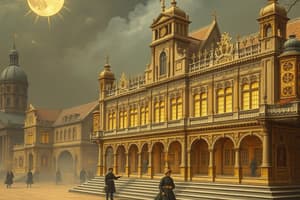Podcast
Questions and Answers
What is the primary purpose of historiography?
What is the primary purpose of historiography?
- To provide an imaginative reconstruction of the past
- To record and analyze past events systematically (correct)
- To analyze past events using primary sources
- To gather artifacts from historical sites
Which of the following best describes historical imagination?
Which of the following best describes historical imagination?
- Critically examining surviving records of the past
- The ability to reconstruct the past creatively within reasonable limits (correct)
- A method for documenting oral histories and legends
- Utilizing creative thinking to interpret cultural artifacts
Who is known as the 'Father of History'?
Who is known as the 'Father of History'?
- Herodotus (correct)
- Gaius Julius Caesar
- C. Vann Woodward
- Thucydides
What distinguishes primary sources from secondary sources in historical study?
What distinguishes primary sources from secondary sources in historical study?
What is one of the main reasons to study history?
What is one of the main reasons to study history?
Who was Corazon Aquino's husband?
Who was Corazon Aquino's husband?
Corazon Aquino returned to the United States Congress as a free president.
Corazon Aquino returned to the United States Congress as a free president.
What tragic event prompted Corazon Aquino to address Congress?
What tragic event prompted Corazon Aquino to address Congress?
How many years before her speech had Corazon Aquino lost her husband?
How many years before her speech had Corazon Aquino lost her husband?
What did Ninoy challenge during his trial?
What did Ninoy challenge during his trial?
What did Ninoy Aquino endure while imprisoned?
What did Ninoy Aquino endure while imprisoned?
Ninoy Aquino was released from prison without any trials.
Ninoy Aquino was released from prison without any trials.
What was Ninoy Aquino's ultimate fate?
What was Ninoy Aquino's ultimate fate?
How did the public react to Ninoy Aquino's death?
How did the public react to Ninoy Aquino's death?
What did Archibald MacLeish state about democracy?
What did Archibald MacLeish state about democracy?
Flashcards are hidden until you start studying
Study Notes
History: A Definition
- An imaginative and interpretative reconstruction of past events based on records, oral history, artifacts and folk traditions.
- A chronological account of past events of a period or in the life or development of a people, an institution, or a place.
- The study of past events with added interpretation.
The Study of History: Key Processes
- Historical Method: Critically examining and analyzing the surviving records of the past.
- Historical Imagination: The process where historians use their creative thinking to reconstruct the past, staying within reasonable boundaries.
Key Figures in History
- Herodotus: A Greek historian considered the “Father of History.” His works, like the account of the Peloponnesian War, are known for their anecdotal and entertaining style.
- Historiography: The art and science of writing history.
Why Study History?
- To learn about the past.
- To understand the present.
- To appreciate our heritage.
- To broaden our horizons.
- To acquire background for critical thinking.
Sources of History: Primary and Secondary Sources
- Primary Sources: Offer first-hand information, such as eyewitness testimony, diaries, and personal letters.
- Secondary Sources: Analyze and interpret primary sources, often providing a broader understanding of events.
- Artifacts: Physical remains, including tools, weapons, and other objects from the past, serve as important historical sources.
- Written or Inscribed Sources: Written records, such as tomb inscriptions, books, and even graffiti, offer valuable insights into the past.
- Graphics and Photographs: Visual materials can provide a unique perspective on historical events, capturing moments, places, and individuals.
Corazon Aquino's Speech Before the US Congress
- Corazon Aquino, the President of the Philippines, gave this speech before the joint session of the United States Congress in 1986.
- Aquino came to the U.S. three years prior to deliver a eulogy for her husband, Ninoy Aquino, who had been assassinated by the Philippine government.
- Aquino notes that her journey from delivering a eulogy to becoming the President of a free Philippines is a testament to the power of democratic values in defying authoritarian regimes.
- The speech was delivered to a joint session of the United States Congress, an indication of the international significance of the Philippine democracy movement.
- Aquino alludes to the political climate in the Philippines in the 1970's under President Ferdinand Marcos, describing the suspension of the constitution, imprisonment of opposition figures, and suppression of democratic rights.
- Aquino describes the hardships endured by her husband during his detention for speaking out against the dictatorship, emphasizing his "unbroken spirit" and his constant fight for democratic ideals.
- Aquino emphasizes that her husband sacrificed his own well-being by refusing to compromise his democratic values even when faced with physical and psychological torture.
- Aquino highlights the importance of Ninoy Aquino's death as a catalyst for the revolution that led to the Philippines' return to democracy.
- Aquino recalls the dictator Marcos's underestimate of her husband's influence, which ultimately led to a massive demonstration of public support during his funeral—a pivotal moment in the Filipino revolution.
- Aquino describes her responsibility to continue her husband's legacy and to champion democratic values, quoting Archibald MacLeish to underscore the need to defend democracy through action.
- Aquino uses her speech to advocate for support from the United States in the Philippines' transition towards democracy.
Studying That Suits You
Use AI to generate personalized quizzes and flashcards to suit your learning preferences.




